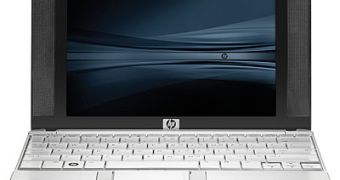When the netbook market was just budding, HP was among the first systems vendors to release their own small-sized portable computer systems. The debut of HP’s Mini-Note on the market took place earlier this year, on April 8. Thought of as the first competitor for ASUS' Eee PC, the new small portable computer system was designed to fit the requirements of the education market.
Apply Daily, a Chinese-language newspaper, learned from HP Taiwan that the demand for the company's Mini-Note has increased considerably since its official release. According to the official line, worldwide sales have increased by 50% each month, a trend that has been sustained ever since the netbook's debut. Apparently, the fast growing demand is mainly due to the Asian market in Taiwan, Hong Kong and Singapore. The company did not disclose any possible reasons for the increase in demand, but the general belief is that it's related to the overall increased level of interest in netbooks on behalf of consumers.
Unlike most of the other netbooks on the market that use Intel's 1.6GHz Atom, the HP Mini-Note 2133 can be powered by a 1.0GHz, 1.2GHz or a 1.6GHz processor from VIA. It can run a Windows Vista operating system or a Linux-based OS. It features just one SODIMM slot, which means that memory can go up to just 1GB. As far as storage is concerned, the netbook can provide a maximum capacity of 160GB on a fast 7200RPM SATA hard drive. A 120GB version is also available. The VIA Chrome 9 handles the netbook's graphics.
Depending on the system configuration, pricing can range from approximately $650 to $1,100. This high price tag, although explainable by the netbook's overall specifications, is also one of the reasons for which many don't consider HP's small-sized ultra-portable computer system a suitable competitor for ASUS' vast Eee PC lineup. With all that, recent rumors also claim that the company is preparing a second version for its HP Mini-Note series, which is due to arrive later this year.

 14 DAY TRIAL //
14 DAY TRIAL //